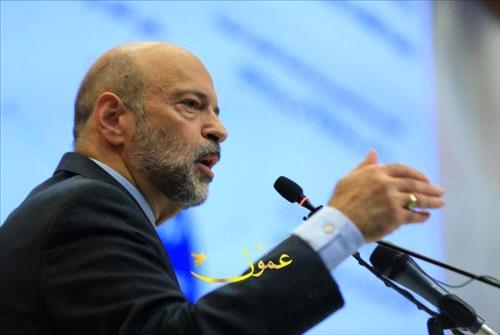Ammon News - AMMONNEWS - Prime Minister Omar Razzaz said that despite regional geopolitical challenges, Jordan has developed a matrix of integrated actions over five years that began to pay off, and that tangible progress was made in "our economic indicators in 2019."
"We are forging ahead with restructuring our national economy in the medium term in order to be able to bear the various burdens imposed by the conditions in the region, particularly the repercussions of the Syrian refugee crisis on Jordan," Razzaz said in an interview with the CNBC Arabia Television at the World Economic Forum in Davos last week.
He said in the interview, which was aired Monday evening, that Jordan realized that it had to put its house in order economically, with a focus on Jordanian youth, its key resource and wealth, through empowering them to enter public life and the labor market.
The premier reviewed the key indicators the economy had made in a host of sectors, pointing to the growth in the information and communications technology (ICT) sector, which reached 11 percent, compared with an estimated 2 per cent economic growth in the region.
He referred to a "significant growth" in the sector's export services, which are mainly remote services that Jordan provides to companies in the Arab Gulf states and Europe.
"Our national exports have grown by 9 per cent through encouraging small- and medium-sized enterprises to export and benefit from the international agreements (the Kingdom signed)," he pointed out.
The tourism sector had also witnessed a growth of about 10 per cent as a result of low-cost air travel to Jordan as large tourist groups began arriving to visit tourist attractions, the prime minister said.
Razzaz also said Jordan had advanced to the 29th rank in the Doing Business Report, just as it ranked fourth globally in the ease of getting credit, having advanced from rank 134th.
"These figures did not come from a vacuum, but were the result of steps and measures taken by the government to improve the business environment," he said, adding that the government had the ambition to achieve more in the five-year scheme.
The prime minister said that Jordan is in a volatile region and it had taken the brunt of the refugee crisis as the Kingdom "warmly" received large numbers of displaced Syrians in the past decade, who now live "among their families and brothers". But such circumstances had placed pressure on the Jordanian economy and the labor market, he pointed out.
He said that the countries of the region and the world should help Jordan bear the burden of refugees as the annual cost of hosting them amounts to $2.4 billion, according to World Bank estimates, and added that Jordan had only received 62% of the cost in 2018 and 42% in 2019.
He voiced his fear that the issue of Syrian refugees will be "marginalized", stating that the refugees "are still present on our land, and that those are the builders of the future of Syria," pointing to the directives of His Majesty King Abdullah II not to leave a Syrian child or any child of any other nationality outside of education and healthcare.
Razzaz called on the world, particularly brotherly Arab countries, to help Jordan "in this critical stage" as the Kingdom forges with real and drastic economic reforms that will contribute to creating job opportunities, increasing exports and launching future mega projects.
The prime minister stressed that Jordan's monetary policy is very sound, adding: "We look forward to stimulating the economy through projects carried out in partnership with the private sector." He noted that there is an economic and financial feasibility study for these projects, the most prominent of which is a national railway project that runs between Aqaba in the south and Ramtha in the north.
"We have 4 or 5 projects in water desalination and treatment, which are ready for partnership with the private sector," Razzaz added, noting that the government is working to launch strategic projects in the energy domain with a view to reduce costs and rejuvenate the economy.
He pointed out that Jordan had developed specific criteria to attract individual investors based on the size of their investments by granting them residency permits and Jordanian nationality, indicating that there are hundreds of investors applying for citizenship.
"We are one of the least countries in the world that imposes taxes in the information and communication technology sector, which grew by 11 percent last year," he said, noting that the ICT sector's service exports jumped by 47 percent while employment soared by 50 percent.
He pointed out that the Jordan Investment Commission has seen a comprehensive overhaul providing its services via digital channels.
Razzaz concluded the interview by renewing the call "to assume a common responsibility for dealing with the impacts of the past decade to which Jordan has been exposed and requires participation in bearing this burden. We will find alternatives and solutions in all cases because we have learned how to tackle all problems and turn them into opportunities, and we are proceeding with the help of our partners in the region and the world."









 comment replay
comment replay 